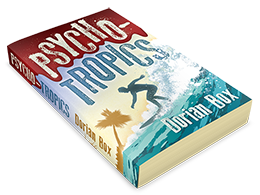![]()
They’re part of our (“our” being authors, publishers, and publicists) livelihood. Hopes and goals depend on them to a very real extent. We obsess over the ones we already have. We obsess over the ones we’re still waiting to get. I’m talking, of course, about the Almighty Amazon Customer Reviews and, in particular, the coveted 5-star rating.
The Contradiction between Great Reviews and Star-Ratings
Especially in the early stages of an indie-publishing book, emotions run high when you find out a new review has been posted for your book. A positive review is exhilarating, anything short of superlative can be crushing. But nothing drives us crazier than getting a glowing written review accompanied by a star-rating at odds with the review. The contradiction lands on you like an anvil on Wile E. Coyote.
While you appreciate the warm, thoughtful commentary in the actual review and try to stay positive, your heart still sinks because you know that each and every star-rating either boosts or drags down your overall average, affecting, Lord knows, how many Amazon ranking algorithms.
Since I started promoting Psycho-Tropics by Dorian Box, I’ve noticed a phenomenon where authors—indie and traditionally published alike—not infrequently, receive superlative reviews with contradictory star-ratings. Stumped by it, I decided to do some research to see if I could find some answers.
Misunderstanding the 5-Star System
One possibility is that some reviewers don’t pay attention to the descriptions of each star actually means. Anne R. Allen points out in her post Amazon Reader Reviews: 12 Things Everybody and His Grandmother Needs to Know that even though some reviewers have the best intentions, they don’t realize they’re giving the book a low rating. She shares this example: “One sweet woman … had been devastated to find out that giving a book ‘a gold star’ wasn’t letting people know she liked the book. She thought one star was a good thing.”
Another plausible reason—and probably a more common one—for the contradiction is that some reviewers confuse rating with ranking. Allen points out that especially for non-tech savvy people and older generations, the five-star rating system is much different than what they’re used to. She says, “They assume they’re like TV Guide movie ratings.”
To put it another way, some people don’t think of Amazon book reviewing as giving a product review. Rather, they think of the star-review method as their own literary ranking system, similar to how professional critics might assign stars to a restaurant or film.
“Well, I really loved this book, but it doesn’t compare to Crime and Punishment!” Instead of rating it, they’re ranking it.
Author Rachel Branton touches on this subject in her blog post, Reviews: What Those Stars Mean to Authors (or When Should I Give 5 Stars). Based on her own experiences with reviews accompanied by mismatched ratings, she advises:
[G]ive a 5-star review if the book fulfills its purpose. It doesn’t need to be earth-shattering or the best book you’ve ever read. It just needs to be a good, compelling novel, comparable with a novel of that same genre … [D]on’t knock a good novel down to four [stars] just to say it’s not as good as that brilliant novel. If we all read only brilliant novels, there would be only a few dozen books to read.
Another possible explanation for incongruence in review content and star-ratings is simply an unwillingness by some people to give the top possible rating for hardly anything—whether movies, books, or ordinary consumer products. This is true even for people who really like the book, as shown by their written review.
If it’s a 5-star system, they’ll max out at a 4; a 4-star system, a 3, etc. Just part of human nature for some. The Amazon review of Gillian Flynn’s Gone Girl rated “most helpful” out of more than 48,000 reviews is perhaps a good example. The headline says “Fiendishly clever mystery novel” and the review is stellar, but the rating is only four stars.
The Problem for Authors: Ratings Matter
Amazon ratings matter, especially for new or indie authors trying to get noticed. For new authors, each review carries disproportionate weight because of the smaller total number. A 1-star review can take four 5-star reviews down to a 4-star average, for example.
It’s difficult enough to get readers to post reviews in the first place. So when one does come along—especially if it’s a glowing one—the last thing we want is for it to render an unintentional strike due to a misunderstanding of the five-star rating method.
The explanations offered above probably aren’t the only reasons for contradictory reviews and star-ratings, but hopefully they provide some insight into an issue that frustrates authors and publishers alike.
Authors, feel free to tweet this link for your reader audience, post it on Facebook, or even on your own website (just please make sure to give due credit and include the link to the original post here on dorianbox.com)!


